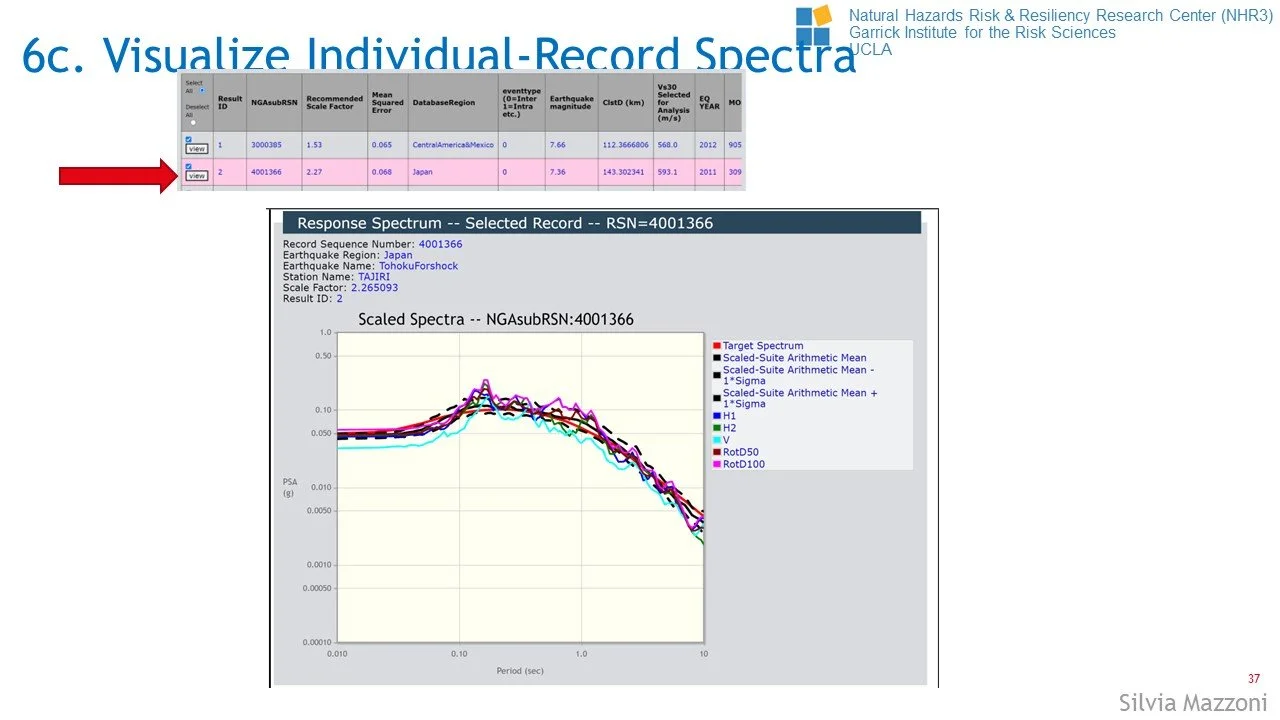Ground-Motion Record Selection and Download
DOI: 10.34948/N3D59V
How to Cite:
Silvia Mazzoni (2022): NGA-Subduction Portal: Ground-Motion Record Selection and Download. The B. John Garrick Institute for the Risk Sciences. InteractiveResource. (https://doi.org/10.34948/N3D59V)
Introduction
NGA-Subduction (“NGA-Sub”) is a large multidisciplinary, multi-year research program to develop database resources and ground motion models for subduction-zone earthquakes. The NGA-Sub project entails extensive technical interactions among 34 individuals and organizations from around the world, who are listed in Bozorgnia et al. (2021) paper in the EERI journal Earthquake Spectra. The data used by the ground-motion portal is a subset of the published flatfile. We recommend accessing the flatfile for additional data and reading the associated reports and papers for documentation. Click here to visit the main NGA-Subduction Project page to access the data and documents.
This ground-motion portal allows the user to download NGA-Subduction time-series files (e.g. acceleration .at2 files) that meet a series of user-defined criteria. The portal also allows the user to compute the scale factors required to meet user-defined scaling criteria. The scaling criteria are defined by a target spectrum that is either defined by the user, or is computed for a user-defined scenario based on the NGA-Subduction Ground-Motion Models (GMMs). The web portal also allows visualization of the time series as well as the response spectra of the selected records.
The recording of the workshop held on the day of the public release is shown below. This video, along with the jpg images of the workshop technical presentation, can be used as instructional guidance.
Ground-Motion Selection Algorithm
The first step algorithm queries the NGA-Subduction flatfile to select records that meet the user’s search criteria. When a target spectrum is defined, the second step of the algorithm computes the a record-specific scale factor that minimizes the Period-Weighted Mean-Squared Error (MSE) between the record’s response spectrum and the target spectrum. The user may chose the response spectrum of any component (RotD50, RotD100, H1, H2, V), unless the target spectrum is defined by the NGA-Subduction GMM. These GMMs compute the RotD50 component of a scenario spectrum, so the user can use only this component in the search. A Period-Weighted MSE is recalculated for each record scaled by the MSE-minimizing scale factor. The Nmax records with the lowest MSE are then returned to the user, where Nmax is the maximum number of records to be used and is defined by the user, but not to exceed 100. The period-dependent weights for the MSE-computation are defined by the user. The PSA outside the weight-function period range specified by the user are not considered in computing MSE nor scale factors. When no target spectrum is defined, the first Nmax records are returned.
Ground-Motion Selection & Download Workflow
The web portal allows the user to execute the following ground-motion selection process:
Set up account & Log in
Select target-spectrum type
Enter temporary access password (given in the instructional video below)
Define target spectrum
No Target Spectrum (NO scaling)
2-Period spectrum – PSA @ .2s, 1.0s, TL
User-Defined Spectrum – list of Periods and PSA (done differently from NGA-West2)
Scenario Spectrum (NGA-Subduction GMM)
Download target spectrum (optional)
Define Search Criteria
Event, Site, Path, & Record Characteristics
Individual Record/Earthquake/Station ID
Define Scaling Criteria
Intensity Measure – RotD50, RotD100, H1, H2, V
Suite Average
Number of records
Type – Minimize MSE, Single-T, above Target
Visualize Records
Suite records vs Mean +/- St Dev
Individual-Record Components
Time Series: Acceleration, Velocity, displacement in all components
Record Metadata
Download UNSCALED Records
.CSV text file with input, metadata, scale factors, and spectra
.at2 acceleration files
.avd time,acceleration,velocity,displacement comma-separated-values (CSV) file (you can open with excel) (NEW!)
Review Report & Records
Limits on Download
Please note that, due to copyrights and agreements with the data owners, a strict limit has been imposed on the number of records that can be downloaded within a unique time window. The current limit is set at approximately 200 records every two weeks, 400 every month. Abusive downloads will result in further restrictions.
Acknowledgment
The portal has been developed by Dr. Silvia Mazzoni of NHR3, in collaboration with numerous individuals in NGA-Sub, and IT support staff.















































